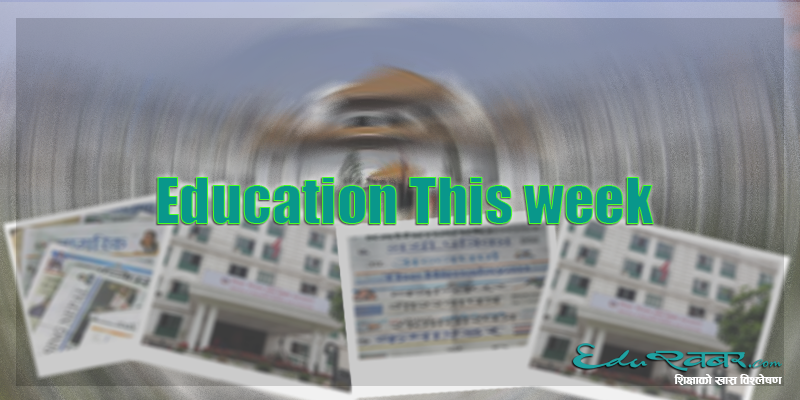Kathmandu - This week news on medical college charging higher fees, and likely extension of current academic session by two months, was reported. Multiple media reported that Bhola Thapa, a professor of engineering and former Registrar of Kathmandu University, was appointed as the new VC of the varsity.
- News stated that Nobel Medical College in Biratnagar has been found to have charged Rs 5.5 lakh more than the fee prescribed by the Medical Education Commission. The commission had instructed the college to return the amount more than the stipulated amount. But the college has not returned it yet. The college administration has instead warned the students to charge a daily fine of Rs 2000 for delaying the payment of the prescribed fee.
A letter to the editor mentioned that a recent meeting of the Medical Education Commission chaired by Prime Minister Oli has decided to form a task force under the coordination of the MoEST to determine the fees for MBBS, BDS and other programs. In previous years, no fees for other programs used to be fixed by the Ministry of Education. Universities were given the responsibility of setting fees for other programs. For the first time since the establishment of the Medical Education Commission, the work done to fix the fees of all programs should be commended.
The news on medical colleges taking higher fees are frequently reported in the media. Even though the unjust charges of private medical colleges are depicted too frequently in the media, the government has failed to respond to the issue. Political connections of private medical college operators have also been published in the media regularly. Uniformity is often hailed for having a system. However, the Commission should fix a ceiling of fees and students should be able to pay based on the quality of teaching and services.
Effects of Covid in education dominates the media coverage of education.
- A news stating the current academic session, which was affected due to Covid-19, is likely to be extended by two months. It stated that the MoEST has started legal consultation to extend the academic session up to the month of Jestha (mid-June) which usually starts from Baisakh (end of April to mid-May) and ends in the month of Chaitra (Mid-April) every year. The existing education regulation has the provision that schools should open for 220 days a year while teaching-learning activities should be carried out for 192 days.
- A letter to the editor suggested that if the schools are to run physical classes, the concerned school management needs to rearrange the classrooms where only two students are allowed to sit on a six-foot long bench or classes run in two shifts, if possible. It also suggested that teachers and guardians together could find a solution to ensure that kids are taught adhering to the health safety protocols.
Safety protocol and organization of public life has been a big drama. Authorities keep on uttering such words whereas they are fully aware that adhering to so called safety protocol is a hoax. Elites of all kinds - economic, political intellectuals seek to follow what the rich industrial nations are trying to prevent the spread. Eventually, it's the people who are having to decide what their instinct instructs.
- A letter to the editor expressed that the online virtual classes were not successful in delivering quality education to the students, rather being just a tool for completing the syllabus.
- Other news included international students not allowed to come to Australia immediately due to COVID prevention policy.

This was a lean week for the overage of news on education. Other matters included in the media are:
- A piece of news reported that Kapilvastu Municipality-2 has awarded bicycles to 25 talented marginalized female students from the Muslim Community studying in grade 11 and grade 12 in Community Alias Governmental Schools. The news also depicted that the cycle would address student’s issues on reaching help students to reach school faster.
- An opinion article expressed the need for joint effort of non-state actors, local, national and international together and forge a common advocacy front to ensure inclusive education for all. The writer had mentioned that the case for investing in truly inclusive and transformative education needs collaborative effort of all the relevant stakeholders to ensure the rights of children and families neglected by the system so far.
|
Abbreviations : COVID- Corona Virus Disease, RM- Rural Municipality, TU- Tribhuvan University, KU-Kathmandu University, AFU- Agriculture and Forestry University, MoEST- Ministry of Education, Science and Technology, TUSC- Tribhuvan University Service Commission, NGOs- Non-Governmental Organizations, TUSC- Tribhuvan University Service Commission, CDC: Curriculum Development Centre, ECD- Early Childhood Development, SEE- Secondary Education Examination, SC- Supreme Court, VC- Vice Chancellor.
|
'Education this Week' is a joint effort to analyze the press coverage of education in Nepal’s selected print media published in Kathmandu (Online scanning was stopped due to the shortage of staff time from last week - apologies with the readers). The main aim of this effort is to identify and explain major education issues picked up by the media and give back and foreground the news. This, we believe, will help policy makers and other responsible people to keep abreast with ongoing concerns and discussions on and around education. EduKhabar, in collaboration with the Center for Educational Policies and Practices (CEPP), has produced this analysis based on the news printed in Kantipur (Nepali) and The Himalayan Times (English) between 20-26 January 2021 (7-13 Magh, 2077) - Editor.
Read this analysis in Nepali : चिकित्सा शिक्षा, शुल्क र महामारी

 This was a lean week for the overage of news on education. Other matters included in the media are:
This was a lean week for the overage of news on education. Other matters included in the media are:
प्रतिक्रिया